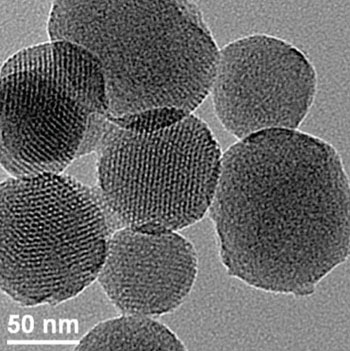Mesoporous Biomaterial Could Provide Relief for Sensitive Teeth
By HospiMedica International staff writers
Posted on 20 Jan 2015
A new biomaterial based on silica can potentially rebuild worn enamel and reduce tooth sensitivity for an extended period.Posted on 20 Jan 2015
Developed by researchers at National Taiwan University (NTU; Taipei), the gelatin-template, mesoporous silica biomaterial contains nanosized calcium carbonate particles mixed with 30% H3PO4 at a 1:1 molar ratio of calcium to phosphate (CCMS-HP). In experiments conducted in dogs, the combination enabled the calcium and phosphate ions created to permeate the dentinal tubules and form dicalcium phosphate dihydrate (DCPD), tricalcium phosphate (TCP), and hydroxyapatite (HAp) crystals at a depth of approximately 40 μm.

Image: Transmission electron microscopy (TEM) image of mesoporous silica (Photo courtesy of the Dr. Victor Lin group at Iowa State University).
This increased depth could be the key, according to the researchers, to repairing damaged enamel and providing longer-lasting relief from tooth sensitivity than current tubuli sealants. Alkaline phosphatase assays and biocompatibility tests showed high cell viability and mineralization ability. In vivo efficacy and biocompatibility analyses of the biomaterial in the animal model revealed significant DCPD, TCP, and HAp crystal growth and no pulp irritation after 70 days. The study was published in the December 2014 issue of ACS Nano.
“The developed CCMS-HP holds great promise for treating exposed dentin by growing biomimetic crystals within dentinal tubules,” concluded lead author, Prof. Chun-Pin Lin, DDS, dean of the NTU school of dentistry, and colleagues. “These findings demonstrate that the mesoporous silica biomaterials presented here have great potential for serving as both a catalyst and carrier in the repair or regeneration of dental hard tissue.”
Mesoporous silica is a form of silica that contains nanometric spheres or rods arranged in a regular pattern of pores. The large surface area of the pores allows the particles to be filled with a drug or other particles that can be taken up by certain biological cells through endocytosis, depending on what chemicals are attached to the outside of the spheres, as well as boosting the in vitro and in vivo dissolution of poorly water soluble drugs.
Related Links:
National Taiwan University














